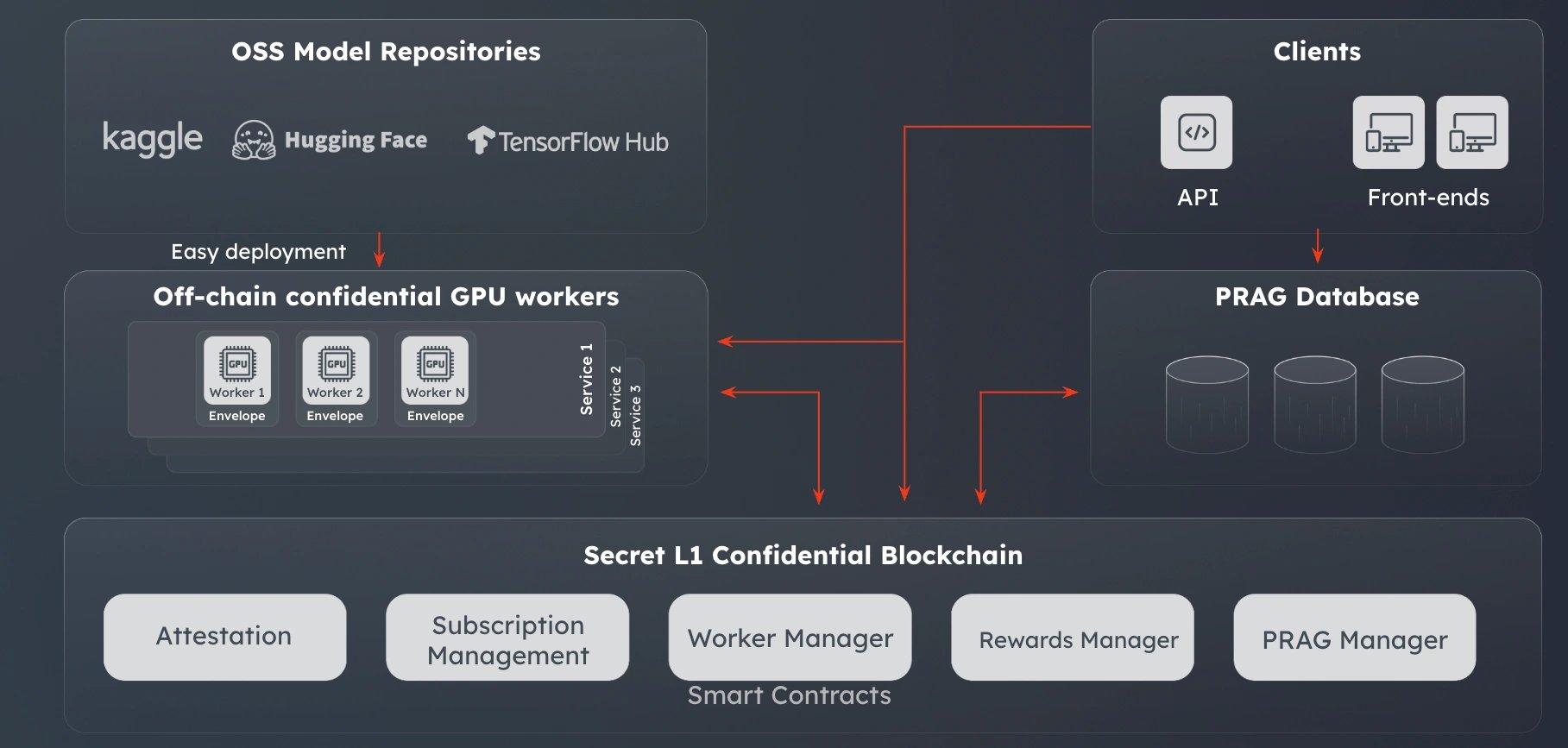위키 구독하기
Share wiki
Bookmark
Secret Network
0%
Secret Network
Secret Network는 기본적으로 개인 정보 보호에 중점을 둔 확장 가능하고 허가 없는 스마트 계약을 제공하여 공개 블록체인에서 불가능한 사용 사례를 가능하게 합니다. Cosmos SDK를 사용하여 구축되었으며, Intel SGX 및 다양한 암호화 체계와 같은 기술을 통해 Cosmos 및 EVM 생태계 전반에 걸쳐 개인 정보 보호 기능을 통합합니다. 또한 개인 메타데이터 옵션을 갖춘 Rust 기반 스마트 계약을 지원합니다. [2]
개요
Secret Network는 블록체인에서 사용자 정의 가능한 개인 정보 보호를 가능하게 하여 사용자가 공유할 데이터, 공유 대상, 공유 기간을 제어할 수 있도록 하여 분산형 웹 채택에 대한 보안을 강화합니다. Cosmos SDK 및 Tendermint 합의 엔진으로 구축되었으며, 개인 정보 보호, 허가 없는 스마트 계약을 지원합니다. 암호화 및 TEE(Trusted Execution Environment) 기술을 사용하여 중요한 정보를 노출하지 않고 분산형 합의를 가능하게 하면서 데이터를 안전하게 유지합니다.
이 네트워크는 암호화된 데이터 저장, 개인 NFT, 개인 정보 보호를 존중하는 DeFi와 같은 고유한 사용 사례를 제공하는 개인 메타데이터 계산을 위한 "Secret Contracts"를 지원합니다. 기본 SCRT 코인은 가스 수수료, 거버넌스 및 스테이킹에 사용되는 반면, 래핑된 토큰(SNIP-20)은 트랜잭션 개인 정보를 보장합니다. Secret Network는 프로그래밍 가능한 개인 정보 보호에 중점을 두어 Monero 및 Zcash와 같은 프로토콜과 차별화되며 글로벌 개발자 커뮤니티에서 지원합니다. [1]
특징
Secret Contracts

Secret Contracts는 개발자가 Rust로 스마트 계약을 작성하여 WebAssembly(Wasm)로 컴파일할 수 있도록 하는 CosmWasm 프레임워크를 사용하여 구축되어 효율적이고 안전한 실행 방법을 제공합니다. Secret Contracts는 표준 CosmWasm 계약과 유사하지만 암호화된 데이터, 보안 엔클레이브 및 키 관리를 처리하는 방식이 다르며 계약의 입력, 출력 및 상태에 대한 개인 정보를 보장합니다.
Secret 계약은 네 가지 주요 구성 요소로 구성됩니다.
- 인스턴스화 - 초기 조건 및 구성을 설정하여 초기화 로직을 실행합니다.
- 실행 - 계약 데이터를 수정하는 트랜잭션 로직을 포함합니다.
- 쿼리 - 계약 데이터를 변경하지 않는 읽기 전용 기능을 제공합니다.
- 상태/저장소 - 계약 데이터를 영구적으로 저장하며, 기본 동작은 트랜잭션 간에 데이터가 유지되도록 보장합니다.
이러한 구성 요소를 통해 Secret Network에서 안전하고 개인적인 계약 실행이 가능하며 다른 Cosmos 기반 스마트 계약 네트워크와의 호환성을 유지합니다. [3]
Secret AI
Secret AI는 사용자 개인 정보를 보장하면서 신뢰할 수 있는 AI 상호 작용을 제공하도록 설계된 분산형 기밀 컴퓨팅 솔루션입니다. Secret Network를 기반으로 구축되었으며, TEE(Trusted Execution Environment)가 있는 NVIDIA 기밀 컴퓨팅을 사용하여 AI 대화에서 사용자 데이터와 메타데이터를 보호합니다. 데이터 유출 및 무단 액세스를 방지하는 안전한 플랫폼을 제공합니다.
Secret AI는 Secret Network의 인프라를 활용하여 결제, 모델 액세스 및 작업자 수입을 포함한 모든 사용자 상호 작용이 네트워크에 기록되고 비공개로 유지되도록 보장합니다. 스마트 계약이 이를 관리하고 SNIP-20 토큰을 사용하여 결제를 수행하여 네트워크를 통해 경제적 보안을 보장합니다. [4]
SRCT

SCRT는 Secret Network의 기본 코인입니다. 트랜잭션 및 계산 수수료 지불, 네트워크를 보호하고 보상을 받기 위해 유효성 검사기로 스테이킹, 커뮤니티 거버넌스 참여 등 여러 가지 용도로 사용됩니다. 가스 결제, NFT 민팅 및 스왑과 같은 SCRT 관련 상호 작용은 Secret 토큰을 통해 개인 메타데이터를 통합할 수 있지만 온체인에서 공개적으로 확인할 수 있습니다.
SCRT의 유틸리티는 여러 영역에 걸쳐 확장됩니다.
- 거버넌스: SCRT는 네트워크의 거버넌스 시스템에서 투표하는 데 사용되며, 스테이킹된 SCRT는 투표권을 나타냅니다.
- 스테이킹 및 인플레이션: SCRT는 네트워크를 보호하기 위해 스테이킹되며, 인플레이션 보상은 스테이커와 유효성 검사기에게 분배됩니다. 토큰노믹스는 스테이킹 비율에 따라 동적 인플레이션율로 지속 가능한 환경을 보장합니다.
- 가스 수수료: SCRT는 트랜잭션 처리에 대한 가스 수수료를 지불하는 데에도 사용됩니다. 이러한 수수료는 유효성 검사기에 인센티브를 제공하고 스테이커에게 분배되어 SCRT 코인에 유틸리티를 제공합니다. [5]
개인 토큰
Secret Network의 SNIP-20 표준을 사용하면 비공개 토큰을 개인의 대체 가능한 토큰으로 래핑하여 Secret Contracts를 통해 보기 키를 통해 완전한 기밀성을 제공할 수 있습니다. 예를 들어 SCRT를 sSCRT(secretSCRT)로 래핑하여 sSCRT와 같은 래핑된 토큰과 관련된 트랜잭션이 발신자 또는 수신자에 대한 가시성 없이 비공개로 유지되도록 할 수 있습니다.
SHD, SEFI, ALTER 및 SIENNA와 같은 Secret Network의 모든 기본 토큰은 기본적으로 개인 정보 보호 기능이 있는 SNIP-20 토큰입니다. 마찬가지로 sATOM, sETH 및 sBNB와 같은 다른 네트워크의 브리지 토큰도 기본적으로 개인 정보 보호 기능의 이점을 누릴 수 있습니다. [5]
파트너십
잘못된 내용이 있나요?
